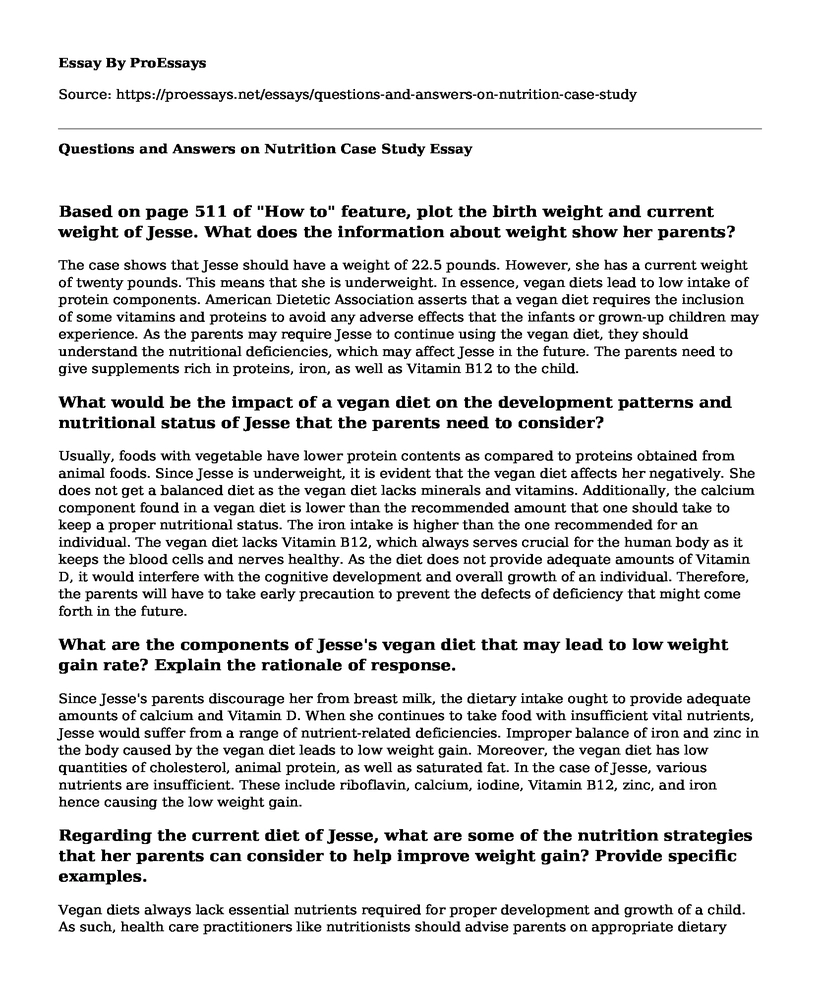Based on page 511 of "How to" feature, plot the birth weight and current weight of Jesse. What does the information about weight show her parents?
The case shows that Jesse should have a weight of 22.5 pounds. However, she has a current weight of twenty pounds. This means that she is underweight. In essence, vegan diets lead to low intake of protein components. American Dietetic Association asserts that a vegan diet requires the inclusion of some vitamins and proteins to avoid any adverse effects that the infants or grown-up children may experience. As the parents may require Jesse to continue using the vegan diet, they should understand the nutritional deficiencies, which may affect Jesse in the future. The parents need to give supplements rich in proteins, iron, as well as Vitamin B12 to the child.
What would be the impact of a vegan diet on the development patterns and nutritional status of Jesse that the parents need to consider?
Usually, foods with vegetable have lower protein contents as compared to proteins obtained from animal foods. Since Jesse is underweight, it is evident that the vegan diet affects her negatively. She does not get a balanced diet as the vegan diet lacks minerals and vitamins. Additionally, the calcium component found in a vegan diet is lower than the recommended amount that one should take to keep a proper nutritional status. The iron intake is higher than the one recommended for an individual. The vegan diet lacks Vitamin B12, which always serves crucial for the human body as it keeps the blood cells and nerves healthy. As the diet does not provide adequate amounts of Vitamin D, it would interfere with the cognitive development and overall growth of an individual. Therefore, the parents will have to take early precaution to prevent the defects of deficiency that might come forth in the future.
What are the components of Jesse's vegan diet that may lead to low weight gain rate? Explain the rationale of response.
Since Jesse's parents discourage her from breast milk, the dietary intake ought to provide adequate amounts of calcium and Vitamin D. When she continues to take food with insufficient vital nutrients, Jesse would suffer from a range of nutrient-related deficiencies. Improper balance of iron and zinc in the body caused by the vegan diet leads to low weight gain. Moreover, the vegan diet has low quantities of cholesterol, animal protein, as well as saturated fat. In the case of Jesse, various nutrients are insufficient. These include riboflavin, calcium, iodine, Vitamin B12, zinc, and iron hence causing the low weight gain.
Regarding the current diet of Jesse, what are some of the nutrition strategies that her parents can consider to help improve weight gain? Provide specific examples.
Vegan diets always lack essential nutrients required for proper development and growth of a child. As such, health care practitioners like nutritionists should advise parents on appropriate dietary intakes for their children. The parents can consider providing other types of food rich in animal protein to enable Jesse to acquire adequate Vitamin B12. These may include eggs, fish, cheese and poultry. Enough Vitamin B12 will prevent the child from having a deficiency in such nutrient. They can also provide vitamin supplements that are available. However, if both the parent and child get enough of Vitamin B12, there would be no need for supplements.
What are some of the vegan foods that can be added to the dietary intake of Jesse to prevent deficiencies caused by insufficient nutrients, since she is not allowed to take breast milk?
Ideally, it is evident that milk from a cow and other dairy products have enough calcium. From this aspect, the parents have to consider adding the foods rich in calcium to the vegan diet. Other calcium sources that would be essential consist of mustard seeds, kales, green leafy vegetables, as well as sesame butter. These nutrients will promote normal growth and development of the child. Weaning Jesse from breast milk would cause a deficiency in Vitamin B12, which might consequently lead to hypotonia and lower body weight gain than the recommended. Provision of supplements will help improve the condition and deal with retardation.
Figure 16-6 provides a meal plan that can be used as a guide in the case of Jesse. Based on this meal plan, show how the parents of Jesse can provide a well-balanced diet that lacks animal foods.
The parents need to give Jesse enough Vitamin B12 through the provision of fortified soymilk. In essence, the supplies will match the recommended daily requirement of Vitamin B12 that serves crucial for normal growth. Jesse should be provided with foods rich in enough iron like cereals, nuts, legumes, soy, and nuts. When Jesse is given food with Vitamin C, there would be a substantial increase in the bioavailability of iron nutrients. These types of foods may comprise spinach, citrus fruit, potatoes, and tomatoes. Beans and soy products can also provide calcium and protein nutrients to Jesse. They have higher amounts of lysine than cereals. Lysine would enhance proper growth and development of the child.
Cite this page
Questions and Answers on Nutrition Case Study. (2022, Sep 22). Retrieved from https://proessays.net/essays/questions-and-answers-on-nutrition-case-study
If you are the original author of this essay and no longer wish to have it published on the ProEssays website, please click below to request its removal:
- Health Assessment Report With the Elaboration of Diagnostic Reasoning
- Biopsychosocial Intervention Paper Example
- Essay Sample on Nursing Education
- The History of Nursing in Canada: From WW1 to Today - Essay Sample
- Essay Sample on Theories of Nursing: Concepts, Definitions, Models & Propositions
- Paper Example on Distracted Driving: Teens Increasingly Involved in Accidents and Fatalities
- Paper Sample on Minority Age Group Health Challenges in Pediatric Industry







